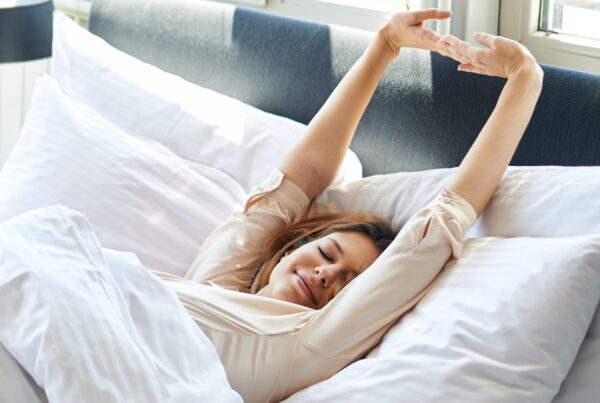Your Sleep Chronotype: The Biological Clock That Keeps on Ticking
We’ve talked a lot about personal sleeping habits, and how parts of our daily routine may be highly disruptive to our sleep cycle without our even knowing it. But, there’s one thing that we can’t fully change, and that’s our sleep chronotype.
What is a Sleep Chronotype?
Our sleep chronotype is our innate, unique biological clock. We actually run on lots of little biological clocks, that inform our preferred times to eat, the hours during which we’re the most productive and how our mood can subtly shift throughout the day. Our sleep chronotype refers to our genetically encoded sleep clock, which covers our 24-hour sleep cycle.
It’s very important to understand that each person’s sleep chronotype is unique. It’s a mistake to assume that we all require the same hours of sleep, and all benefit the same from going to bed at a specific time, and waking up at a specific time. Knowing your unique sleep chronotype will help you develop a daily and nightly schedule that supports your specific circadian rhythm.
The 3 General Chronotypes
For a long time, it’s been established that there are 3 specific sleep chronotypes, as follows:
- Early Birds: The early bird wakes up at sunrise or slightly earlier, feeling awake and energized for the day, and goes to bed at a relatively early hour
- Hummingbird: The hummingbird wakes up somewhat early in the morning, and goes to bed somewhat early
- Night Owl: The night owl likes to go to bed late, and sleep in the next morning
Most of us can name several friends and family who fall into each category, and we basically all know where we stand. But, the problem is that this leaves out some important factors, including a whole other category, which is disordered sleepers, who make up about 10% of the population. We’ll come back to that later.
We’ve touched upon the idea of sleep drives, and how each of us have our own, similarly to our personal sex drive. This is very much determined by genetics, which means that it’s not really going to change all that much over time. Those with a low sleep drive are easily disturbed during sleep, waking up at every little sound. Overall, they tend to wake up feeling less than refreshed.
Those with a high sleep drive need a lot of sleep, and, wish that there were more hours in the night. They may be prone to taking naps as well. Those with a high sleep drive also tend to wake up feeling less than refreshed.
Lastly, we have those with a medium sleep drive, who generally sleep deeply and wake up feeling refreshed after getting 7 hours of sleep.
There is also the matter of personality. Some of us are very health conscious or work-motivated, and make a point to wake up at sunrise because we feel that it’s beneficial. Artistic types and those who like to party are more likely to be night owls.
But still, we need to consider the chronotype of disordered sleepers, who can be either night owls or early birds. Generally, a disordered sleeper is someone who gets less than 6 hours per night and has a unique personality and sleep drive compared to others.
Renaming the Chronotypes
The whole “early bird,” “hummingbird” and “night owl” classification system is a bit outdated, mainly because it doesn’t take into account disordered sleepers. Besides that, we’re not birds, but mammals. And, mammals each have their own species-specific chronotype, hence this new, more accurate chronotype classification below.
- Lion: A lion is the ultimate early bird, enjoying their first kill before dawn.
- Bears: Bears exemplify the hummingbird chronotype, since in nature, they wake up at sunrise and go to sleep at sundown.
- Wolves: Wolves are night predators who are awake long after dark to catch their prey.
- Dolphins: Dolphins are the disordered sleepers, and for a very interesting reason. Dolphins sleep unihemispherically, which means that half of their brain is asleep, while the other stays awake and alert to catch predators. So, dolphins are never quite asleep.
Can You Change Your Chronotype?
A common question is whether or not a person can change their chronotype. The answer, in short, is no. A chronotype is genetic. It’s encoded in our DNA, as part of our biological homeostasis. We can’t change from being, say, a dolphin to a lion, but what we can do is shift that biological clock by 1 to 2 hours. More importantly, we can make changes to our daily routines that support our chronotype rather than work against it.
We do know that a chronotype can change to some extent as we age. That’s why seniors tend to wake up and go to bed must earlier than a teenager for example. We call this “chronolongevity.” A person can become a lion or a dolphin as they get older due to natural shifts in circadian rhythm influenced by specific factors in our bodies. A person who becomes a dolphin can do so because of biological traits, or something as simple as medications. But, what we know is changing the timing of our meals, our light exposure and so on can help us make the most out of our own chronotype.
Take the Quiz
Not sure what your chronotype is? Take this short quiz to find out. From there, you can learn more about your chronotype, and how you can support your natural circadian rhythm to maximize your unique sleep drive and timing preferences.







